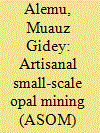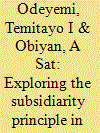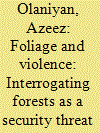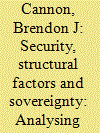|
|
|
Sort Order |
|
|
|
Items / Page
|
|
|
|
|
|
|
| Srl | Item |
| 1 |
ID:
160220


|
|
|
|
|
| Summary/Abstract |
The commencement of opal mining in Ethiopia a decade ago has attracted the involvement of poor peasants, wealthy traders and traffickers. Although the academic and official literature on artisanal small-scale opal mining (ASOM) has primarily focused on the loss of wealth owing to a lack of skill and its traditional nature, this study explores the multidimensional insecurity that the discovery and mining of opal stones in the Delanta wereda of Wollo has brought about. This study contends that the ASOM industry has brought a new and previously unknown body of wealth to a society that is not used to the circulation of huge amounts of money in its narrow geography of commerce, engendering multidimensional insecurity. To make things worse, the network of patrimony and rentierism connecting locals with powerful people at the regional and federal level has given licence to illegal wealth extraction at the cost of exacerbating local insecurity. The qualitative data for the study was collected using interviews, focus group discussions, non-participant observations and document analyses at Delanta mining sites, the Wegel Tena town administration and Dessie city.
|
|
|
|
|
|
|
|
|
|
|
|
|
|
|
|
| 2 |
ID:
160219


|
|
|
|
|
| Summary/Abstract |
The provisions of the 1999 Constitution, which recognises the existence of a single police force and forbids parallel police organisations, have oftentimes generated controversies among actors in the Nigerian federal polity. Rising insecurity precipitates lingering questions on the utility and adequacy of a single, highly centralised and centrally controlled police force given Nigeria’s geographic vastness and demographic diversity. Conversely, arguments have also dwelt on the dangers of fragmentation considering Nigeria’s psychosocial, economic and political nature. This article attempts to balance these arguments by analysing policing and the operations of the Nigeria Police Force (NPF) through the lens of the subsidiarity principle. Subsidiarity is a governance principle in federations, captured in the founding documents of the European Union (EU), which prescribes that governmental powers, authorities and duties should be held by the tier that can best perform them equitably, efficiently, effectively, suitably and based on interest and need. Drawing largely on interviews with purposively selected police scholars, political actors, civil society organisations and police personnel, the paper contends that this principle offers a pragmatic solution to the perennial problems of intergovernmental frictions on the use of the police within the context of governance in the Nigerian federation.
|
|
|
|
|
|
|
|
|
|
|
|
|
|
|
|
| 3 |
ID:
160221


|
|
|
|
|
| Summary/Abstract |
The discourse on security challenges in Nigeria has generated much scholarly insight. What is yet to be sufficiently interrogated is the place of forests in the problem. Situating the problem within the context of global occurrences, the study explores security threats posed by the poor management of some Nigerian forests, which has resulted in invasion and exploitation by criminals who engage in militancy, kidnapping, ritual killing, armed robbery, cattle rustling and cannabis cultivation. Using the theory of ungoverned spaces as a foundation, the study locates the major reason for the invasion and use of forested landscape for criminal activities in the Nigerian state, the presence of the authorities in these sanctuaries is either non-existent or, at best, sporadic.
|
|
|
|
|
|
|
|
|
|
|
|
|
|
|
|
| 4 |
ID:
160216


|
|
|
|
|
| Summary/Abstract |
Recruiting more women into peacekeeping operations due to the perceived unique contributions they are said to make to missions has been widely advocated by the United Nations (UN) and other agencies as a means to overcome the unintended consequents of deployments – mainly the ongoing reports of sexual abuse of locals by male soldiers. However, taking into account the broader gender debates surrounding women’s contributions to peacekeeping, and by considering the experiences of women in the South African National Defence Force (SANDF), this study reveals the challenges women face in realising these widely advocated contributions. These challenges include the current recruiting processes, the self-perception of female soldiers, the deeply patriarchal ideologies within South African society, and the hyper-masculine culture which overwhelms the military. The study concludes that, for women to be properly utilised, a reassessment of recruitment processes in the SANDF is necessary, gender training should be prioritised, and an androgynous soldier identity should be advocated.
|
|
|
|
|
|
|
|
|
|
|
|
|
|
|
|
| 5 |
ID:
160218


|
|
|
|
|
| Summary/Abstract |
Kenya’s decision to close the Dadaab refugee camp complex highlights structural flaws in the international refugee regime. While much attention has been paid to Kenya’s reasoning, less has been given to the reactions of organisations and states. Given the state’s primacy in the international system and uncertainty about refugees, Kenya’s decision is perhaps unsurprising. It is contended that the stakeholders were unprepared because of path dependence and disbelief that Kenya would repatriate the refugees. While stakeholder reactions arguably demonstrate concern for refugees, the international refugee regime remains unquestioned, sustaining revenue streams that may fuel corruption, encourage lengthy encampment and prolong conflict.
|
|
|
|
|
|
|
|
|
|
|
|
|
|
|
|
|
|
|
|
|